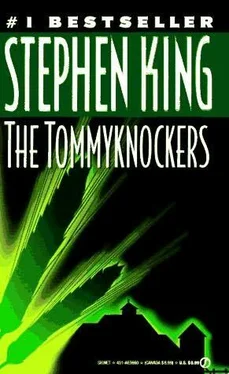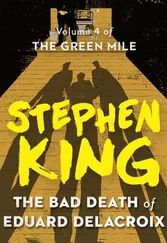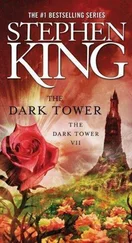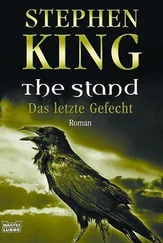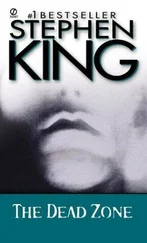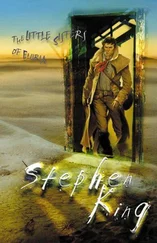Stephen King - The Tommyknockers
Здесь есть возможность читать онлайн «Stephen King - The Tommyknockers» весь текст электронной книги совершенно бесплатно (целиком полную версию без сокращений). В некоторых случаях можно слушать аудио, скачать через торрент в формате fb2 и присутствует краткое содержание. Год выпуска: 1987, Жанр: Фантастика и фэнтези, на английском языке. Описание произведения, (предисловие) а так же отзывы посетителей доступны на портале библиотеки ЛибКат.
- Название:The Tommyknockers
- Автор:
- Жанр:
- Год:1987
- ISBN:нет данных
- Рейтинг книги:4 / 5. Голосов: 1
-
Избранное:Добавить в избранное
- Отзывы:
-
Ваша оценка:
- 80
- 1
- 2
- 3
- 4
- 5
The Tommyknockers: краткое содержание, описание и аннотация
Предлагаем к чтению аннотацию, описание, краткое содержание или предисловие (зависит от того, что написал сам автор книги «The Tommyknockers»). Если вы не нашли необходимую информацию о книге — напишите в комментариях, мы постараемся отыскать её.
The Tommyknockers — читать онлайн бесплатно полную книгу (весь текст) целиком
Ниже представлен текст книги, разбитый по страницам. Система сохранения места последней прочитанной страницы, позволяет с удобством читать онлайн бесплатно книгу «The Tommyknockers», без необходимости каждый раз заново искать на чём Вы остановились. Поставьте закладку, и сможете в любой момент перейти на страницу, на которой закончили чтение.
Интервал:
Закладка:
Stephen King
The Tommyknockers
FOREWORD
Like many of the Mother Goose rhymes, the verse about the Tommyknockers is deceptively simple. The origin of the word is difficult to trace. Webster's Unabridged says Tommyknockers are either (a) tunneling ogres or (b) ghosts which haunt deserted mines or caves. Because “tommy” is an archaic British slang term referring to army rations (leading to the term “tommies” as a word used to identify British conscripts, as in Kipling-it's Tommy this, an” Tommy that…”) the Oxford Unabridged Dictionary, while not identifying the term itself, at least suggests that Tommyknockers are the ghosts of miners who died of starvation, but still go knocking for food and rescue.
The first verse ('Late last night and the night before,” etc.) is common enough for my wife and myself to have heard it as children, although we were raised in different towns, different faiths, and came from different descendants-hers primarily French, mine Scots-Irish.
All other verses are products of the author's imagination.
That author-me, in other words-wishes to thank his spouse, Tabitha, who is an invaluable if sometimes maddening critic (if you get mad at critics, you almost always can be sure they are right), the editor, Alan Williams, for his kind and careful attention, Phyllis Grann for her patience (this book was not so much written as gutted out), and, in particular, George Everett McCutcheon, who has read each of my novels and vetted it carefully-primarily for weapons and ballistics reasons, but also for his attention to continuity. Mac died while this book was in rewrite. In fact, I was obediently making corrections suggested by one of his notes when I learned he had finally succumbed to the leukemia he had battled for nearly two years. I miss him terribly, not because he helped me fix things but because he was part of my heart's neighborhood.
Thanks are due to others, more than I could name: pilots, dentists, geologists, fellow writers, even my kids, who listened to the book aloud. I'm also grateful to Stephen Jay Gould. Although he is a. Yankee fan and thus not entirely to be trusted, his comments on the possibilities of what I'd call “dumb evolution” helped to shape the redraft of this novel (e. g. The Flamingo's Smile).
Haven is not real. The characters are not real. This is a work of fiction, with one exception:
The Tommyknockers are real.
If you think I'm kidding, you missed the nightly news.
STEPHEN KING
Late last night and the night before,
Tommyknockers, Tommyknockers, knocking at the door.
I want to go out, don't know if I can,
because I'm so afraid of the Tommyknocker man.
BOOK 1
THE SHIP IN THE EARTH
Well we picked up Harry Truman, floating down from Independence, We said, “What about the war?” He said, “Good riddance!” We said, “What about the bomb? Are you sorry that you did it?” He said, “Pass me that bottle and mind your own bidness.”
“Downstream”, The RainmakersChapter 1
Anderson Stumbles
For want of a nail the kingdom was lost-that's how the catechism goes when you boil it down. In the end, you can boil everything down to something similar-or so Roberta Anderson thought much later on. It's either all an accident… or all fate. Anderson literally stumbled over her destiny in the small town of Haven, Maine, on June 21st, 1988. That stumble was the root of the matter; all the rest was nothing but history.
Anderson was out that afternoon with Peter, an aging beagle who was now blind in one eye. Peter had been given to her by Jim Gardener in 1976. Anderson had left college the year before with her degree only two months away to move onto her uncle's place in Haven. She hadn't realized how lonely she'd been until Gard brought the dog. He'd been a pup then, and Anderson sometimes found it difficult to believe he was now old-eighty-four in dog's years. It was a way of measuring her own age. 1976 had receded. Yes indeed. When you were twenty-five, you could still indulge in the luxury of believing that, in your case, at least, growing up was a clerical error which would eventually be rectified. When you woke up one day and discovered your dog was eighty-four and you yourself were thirty-seven, that was a view that had to be re-examined. Yes indeed.
Anderson was looking for a place to cut some wood. She'd a cord and a half laid by, but wanted at least another three to take her through the winter. She had cut a lot since those early days when Peter had been a pup sharpening his teeth on an old slipper (and wetting all too often on the dining-room rug), but the place was still not short. The property (still, after thirteen years, referred to by the townspeople as Frank Garrick's farm) had only a hundred and eighty feet on Route 9, but the rock walls marking the north and south boundaries marched off at diverging angles. Another rock wall-this one so old it had degenerated into isolated rock middens furred with moss-marked the property's rear boundary about three miles into an unruly forest of firstand second-growth trees. The total acreage of this pie-shaped wedge was huge. Beyond the wall at the western edge of Bobbi Anderson's land were miles of wilderness owned by the New England Paper Company. Burning Woods on the map.
In truth, Anderson didn't really need to hunt a place to do her cutting. The land her mother's brother had left her was valuable because most of the trees on it were good hardwood relatively untouched by the gypsy-moth infestation. But this day was lovely and warm after a rainy spring, the garden was in the ground (where most of it would rot, thanks to the rains), and it wasn't yet time to start the new book. So she had covered the typewriter and here she was with faithful old one-eyed Peter, rambling.
There was an old logging road behind the farm, and she followed this almost a mile before striking off to the left. She was wearing a pack (a sandwich and a book in it for her, dog biscuits for Peter, and lots of orange ribbon to tie around the trunks of the trees she would want to cut as September's heat ebbed toward October) and a canteen. She had a Silva compass in her pocket. She had gotten lost on the property only once, and once was enough to last her forever. She had spent a terrible night in the woods, simultaneously unable to believe she had actually gotten lost on property she for Christ's sweet sake owned and sure she would die out here-a possibility in those days, because only Jim would know she was missing, and Jim only came when you weren't expecting him. In the morning, Peter had led her to a stream, and the stream had led her back to Route 9, where it burbled cheerfully through a culvert under the tar only two miles from home. Nowadays she probably had enough woods savvy to find her way back to the road or to one of the rock walls bounding her land, but the key word was probably. So she carried a compass.
She found a good stand of maple around three o'clock. In fact, she had found several other good stands of wood, but this one was close to a path she knew, a path wide enough to accommodate the Tomcat. Come September 20th or so-if someone didn't blow the world up in the meantime-she would hook her sledge up to the Tomcat, drive in here, and do some cutting. Besides, she had walked enough for one day.
“Look good, Pete?”
Pete barked feebly, and Anderson looked at the beagle with a sadness so deep it surprised and disquieted her. Peter was done up. He seldom took after birds and squirrels and chipmunks and the occasional woodchuck these days; the thought of Peter running a deer was laughable. She would have to take a good many rest stops on the way back for him… and there had been a time, not that long ago (or so her mind stubbornly maintained), when Peter would always have been a quarter of a mile ahead of her, belling vollies of barks back through the woods. She thought there might come a day when she would decide enough was enough; she'd pat the seat on the passenger side of the Chevrolet pickup for the last time, and take Peter to the vet down in Augusta. But not this summer, please God. Or this fall or winter, please God. Or ever, please God.
Читать дальшеИнтервал:
Закладка:
Похожие книги на «The Tommyknockers»
Представляем Вашему вниманию похожие книги на «The Tommyknockers» списком для выбора. Мы отобрали схожую по названию и смыслу литературу в надежде предоставить читателям больше вариантов отыскать новые, интересные, ещё непрочитанные произведения.
Обсуждение, отзывы о книге «The Tommyknockers» и просто собственные мнения читателей. Оставьте ваши комментарии, напишите, что Вы думаете о произведении, его смысле или главных героях. Укажите что конкретно понравилось, а что нет, и почему Вы так считаете.
